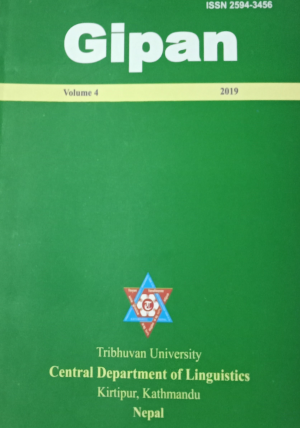Dynamics of meaning-making in Nepali-English bilingual interactions
DOI:
https://doi.org/10.3126/gipan.v4i0.35460Keywords:
Nepali, English, urban settings, meaning-making, daily speechAbstract
A growing proportion of Nepali speakers settled in urban areas who were educated through English-medium boarding schools present a tendency to use numerous English expressions along with Nepali in their daily interactions. This is also the case in some specific socio-professional environments such as TV and radio entertainment broadcasts made for the latest generations. The speakers make use of a variety of discursive resources for expressive purposes. The combinatory properties of such mixed language practices allow them to construct meaning in order to fit the requirements of particularly demanding social interactions, where most speakers exhibit the knowledge of a complex linguistic repertoire. The purpose of this article is to introduce the sociolinguistic context of contemporary urban Nepalese society, based on the most recent studies which have attempted to apprehend the role of English in Nepal today. A brief analysis of several examples of interactions extracted from a media corpus is also presented to make visible the mechanisms of meaning-making in a conversation where the two participants alternate Nepali and English.
Downloads
Downloads
Published
How to Cite
Issue
Section
License
This license enables reusers to distribute, remix, adapt, and build upon the material in any medium or format for noncommercial purposes only, and only so long as attribution is given to the creator.

